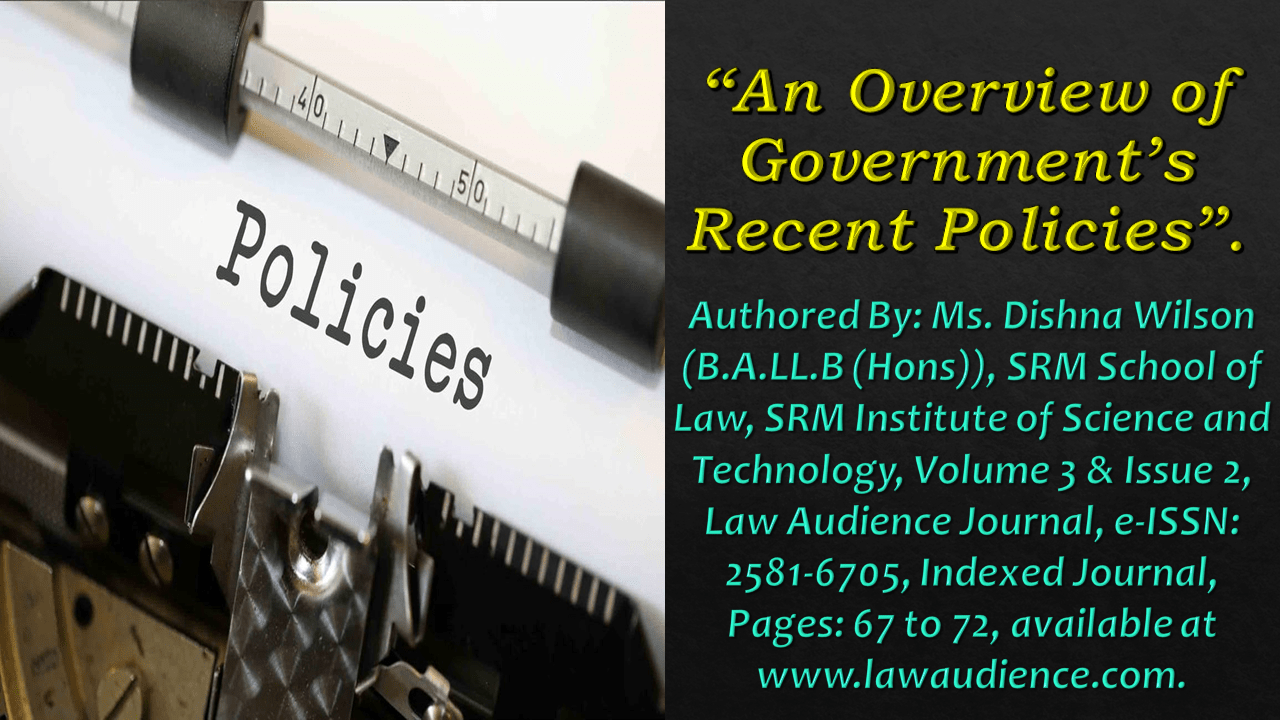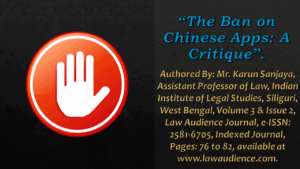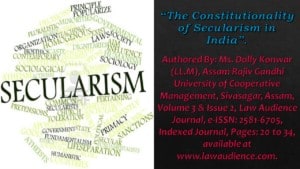Click here to download the full paper (PDF)
Authored By: Ms. Dishna Wilson (B.A.LL.B (Hons)), SRM School of Law, SRM Institute of Science and Technology,
Click here for Copyright Policy.
I. INTRODUCTION:
“Our country has always been to be known as the best example of a democratic country. We have had cultural heritage merged with an acquisitive law-making body. Our government has been comprised of three organs along with the legislature, executive and judiciary. Montesquieu’s separation of power is a beautiful concept implemented in our system. But right now, recent policies and actions of the leading government have caused doubt in all of these aspects. In the year 1976, the Indira Gandhi led government brought about the 42nd Amendment, the effect of which was the change from ‘sovereign, democratic, republic’ to ‘sovereign, socialist, SECULAR, democratic, republic’.”
II. AN OVERVIEW OF THE GOVERNMENT’S RECENT POLICIES:
The current government is under the leadership of Prime Minister Shri. Narendra Modi has brought into existence some exciting changes such as the recent judgment in the case of Shayara Bano vs. Union of India[1], wherein the Supreme Court stated Triple Talaq to be unconstitutional, the introduction of National Education Policy 2020, under which the students would be in touch with the practical aspect of knowledge. The Swatch Bharat Abhiyan, the Pradhan Mantri Ujjwala Yojana,[2] a scheme to eliminate open defecation and improve solid waste management etc. When focusing on a broader perspective, the main advantage of a democracy is that citizens can always voice out their opinion.
For instance, recently, the Communist Party of India (hereinafter referred to as CPI(M)) led government of Kerala proposed implementing Section 118A of the Police Act 1861, which was widely criticised[3] based on a violation of Article 19 of the Indian Constitution which talks about the freedom of speech and expression. Due to such revolts and constructive criticism based around the decision, the proposition of implementation was overruled. The not-so-forgotten incident of the Citizenship Amendment Act, 2019, (hereinafter referred as CAA) protests that took place all over the country was about the violation of the word ‘secularism’ that is expressly stated in the Constitution. Even though the Act was widely criticised, the government barely took an effort to address the people and their concerns on the situation. The protests against the CAA were based on the fact that it was against the constitutional framework and with India being a secular country, it shouldn’t be uplifting or targeting a single religion. A common question that was asked during this period in support of the decision was, ‘How does this violate the rights of Indian Muslims?’ and the answer to this question, is again a question ‘How are Non-Indian Muslims different?’ When the country is ready to accept the refugees which indeed is a great act, how can the Muslims be excluded from the same?
Indirectly most of the Acts and practices led by the Shri. Narendra Modi government have resulted in religious conflicts. Shri. Amit Shah, Home Minister and member of Rajya Sabha had openly stated in the parliament of linking CAA to National Register of Citizens (NRC). He had also tweeted that, “First we will pass the Citizenship Amendment bill and ensure that all the refugees from the neighbouring nations get the Indian citizenship. After that NRC will be made and we will detect and report every infiltrator from our motherland.”[4]
Indian Agricultural or Farm Acts, 2020, which includes three parts i.e., Farmers’ Produce Trade and Commerce (Promotion and Facilitation) Act, 2020, the Farmers (Empowerment and Protection) Agreement on Price Assurance and farm Services Act, 2020, and the Essential Commodities (Amendment) Act, 2020, is another initiative undertaken by the BJP Government. These Acts have been said to be made for the benefit of the farmers whereas the farmers themselves are revolting against these Acts. The government has stated that this initiative will allow farmers to sell their products to corporates directly. In India, the majority of the farmers are small-scale farmers. They will find it very difficult to sell their production to wholesale marketers without adding an actual MSP for majority of the products. This might force them to settle down for the price decided by large chain of capitalist. MSP (Minimum Support Price), has not been added for all goods, only 23 agricultural goods have been listed out under the criteria for MSP.[5] As we are aware majority of the agriculture sector is constituted with this can lead to misusing of loopholes by the corporates rather than benefiting the small-scale farmers. With all these protests since November 2020 around the borders of Delhi, the government is still not ready to address the farmers and rectify or come up with a solution for tackling their concerns. In a democracy, the parliament might make laws that are unconstitutional and protests relating to them are expected. While this act was passed the country witnessed a nationwide protest.[6] However, the government wasn’t ready to rectify their mistakes or compromise with a few conditions. The representatives could have negotiated on a few terms in the act, like inserting MSP for every product. Through this way the whole system would be benefitted. Instead, the protestors had to face tear gas attack by the police executives.[7]
In the current scenario of our country, any comments made against the government are charged under section 43 of the Unlawful Activities (Prevention) Act, 1967, commonly known as “terrorism charges”.[8] The Youth has always been an essential resource to any country, yet the students’ revolt during the time of CAA, were dealt in an unhealthy manner. Students in Jamia was attacked overnight, they were beaten off even during a peaceful protest.[9] The excessive amount of power given to police executives might be seen as a problem. Coming into the pandemic times, there was an establishment of the PM CARES FUND, which was a public authority set-up to collect money for citizens’ welfare from the people all over the world in leu of the Corona Virus Disease. The government held that the Right to Information Act, 2005, could not be applied for the above-mentioned bank account as it cannot be categorised as public authority under section 2(h) of RTI Act, 2005. The question is ‘Why public amount cannot be categorised as public authority?’.
The money was not seen as much as it should have on health infrastructure. We have donations coming from all around the world yet people kept dying due to lack of oxygen.[10] As usual, the ruling government kept silent when questions were leashed back onto them in the parliament by the opposition party. The government failed to address the concerns of the people, the second wave of covid tolled up the numbers of dead people in ganga. The country faced one among its darkest nights during second wave.[11] The recent behaviour of the BJP ministers has evolved and glorified the term “Love Jihad”.
As per the law, a significant citizen of the country has the right to choose their life partner, and if it amounts to an inter-faith marriage, both the parties will be governed under the Special Marriage Act, 1954. A recent incident in Uttar Pradesh was a shock to the crowd. A marriage in UP was stopped only because the police got a false information that the bridge and groom was Hindu-Muslim.[12] Also, it was soon labelled as ‘Love Jihad’. Religious myths and notions can bring such effects which may directly or indirectly affect the personal choice of an individual. These incidents are definitely in contradiction to Article 21 (Right to Life). In 1954, the Special Marriage Act was implemented to protect the right of citizens who have chosen to marry from external communities.[13] It is depressing to know that even in the 21st century, where the world is rising to conquer a pandemic through vaccination, India is still plunging into cultural stereotypes. We should take a moment to question ourselves about when the world is travelling forward how did we end up travelling backwards? Looking down through our history, discrimination initially started from caste. People belonging to lower caste were treated as untouchables.
It was a very tense situation then. Right now, in this modern era if the division based on religion continues, then it will slowly reach back to square one, i.e., caste. We have the world evolving towards technology and sustainable living and India on the other hand is moving backwards to the problems we faced during partition.
The leading watchdog of the Indian Constitution, the judiciary has also shown double standards in many cases. Criminal Contempt of court was filed against Prashant Bhushan for fairly criticising the bench. The tweets posted by Kunal Kamra were also charged under Contempt of Court.[14] Having strong voices for the citizens and the right to vote our leaders is the true spirit of any democratic country. All these acts were fair criticism of the government and the judiciary.
III. CONCLUSION:
Universal Adult Franchise, simply means that in a democratic country a major citizen (anybody above the age of 18) has the right to vote. We have a common tendency to squander this right with silly justifications. There were times when people fought for such rights, it took a lot of blood and sweat to gain these rights and pass it on to the upcoming generations. The youth should be engaged more with politics, as criticism has always been the best way to evaluate the outcomes of governmental policies. When it comes to education, mostly the legislature organ of the government lacks basic education which must be rectified. If the law-making body has no clue about the prospective or power of education, then how can the youth of the country be benefited. Media always has a major impact on the citizens. All we see these days are adulterated and irrelevant news, non-biased opinions and discussions should be welcomed.
No country is perfect, we have to make it perfect. People should be educated about their rights; they should be aware that they have the ultimate power in a democracy. After all normal citizens are 1,366 million in number, peaceful and legal protests are always necessary for the better working of the system. The bright side of a democracy is that citizens have the actual power to choose between right and wrong, it is a privilege.
As Abraham Lincoln once stated, “Democracy is the rule of the people, for the people and by the people”. No matter what or who the ruling party is, the CONSTITUTION OF INDIA is the ultimate foundation of the world’s largest DEMOCRACY.
References & Footnotes:
[1] (2017) 9 SCC 1.
[2] Ujjwala Scheme 2.0: Know About Eligibility & Benefits as PM Modi Adds 1 Crore New Beneficiaries Today, available at https://www.news18.com/news/india/pradhan-mantri-ujjwala-yojana-narendra-modi-lpg-connection-4065971.html.
[3] Kerala Government to Withdraw Controversial Amendment to Police Act, available https://www.thehindubusinessline.com/news/national/kerala-government-to-withdraw-controversial-amendment-to-police-act/article33169588.ece.
[4] Rohan Venkataramakrishnan, Who Is Linking Citizenship Act to NRC? Here Are Five Times Amit Shah Did So, available at https://scroll.in/article/947436/who-is-linking-citizenship-act-to-nrc-here-are-five-times-amit-shah-did-so.
[5] What Are New Farm Laws and Why Farmers Are Protesting, available at https://timesofindia.indiatimes.com/india/what-are-new-farm-laws-and-and-why-farmers-are-protesting/articleshow/79609234.cms.
[6] Arun Maira, Farmer Protests, Dissent, and Disappointment, available at https://idronline.org/podcasts/on-the-contrary-podcast-social-impact/farmer-protests-dissent-and-disappointment/?gclid=CjwKCAjw9uKIBhA8EiwAYPUS3DpsNnkeegKDC5YJCiW6B3lFvJrYcYoDBZKEOg-_xJ8b5WUfm7MYvRoCgcEQAvD_BwE.
[7] Soumita Sen, Tear Gas Used to Keep Protesting Farmers Out of Delhi, available at https://www.youthkiawaaz.com/2020/11/massive-protest-by-farmers-agains-the-new-farm-bills/.
[8] The Unlawful Activities (Prevention) Act, 1967, No. 37, Acts of Parliament, 1967 (India).
[9] kritika sharma & ananya bhardwaj, Jamia Students’ Protest Was Peaceful, Violence Started ‘After Local Residents Entered University’, available at https://theprint.in/india/jamia-students-protest-was-peaceful-violence-started-after-local-residents-entered-university/335768/.
[10] Ibid.
[11] Soutik Biswas, Covid-19: Has India’s Deadly Second Wave Peaked?, available at https://www.bbc.com/news/world-asia-india-57225922.
[12] Avaneesh Mishra, ‘Love Jihad’ Rumour: Wedding Stopped In UP, Muslim Couple Kept Overnight At Police Station, available at https://indianexpress.com/article/india/love-jihad-rumour-wedding-stopped-in-up-muslim-couple-kept-overnight-at-police-station-7100211/.
[13] Special Marriage Act, 1954, No. 43, Acts of Parliament, 1954 (India).
[14] TNM Staff, Prashant Bhushan Guilty of Contempt of Court, Rules Supreme Court, available at https://www.thenewsminute.com/article/prashant-bhushan-guilty-contempt-court-rules-supreme-court-130723.
Cite this article as:
Ms. Dishna Wilson, An Overview of Government’s Recent Policies, Vol.3 & Issue 2, Law Audience Journal (e-ISSN: 2581-6705), Pages 67 to 72 (21st August 2021), available at https://www.lawaudience.com/an-overview-of-governments-recent-policies/.



